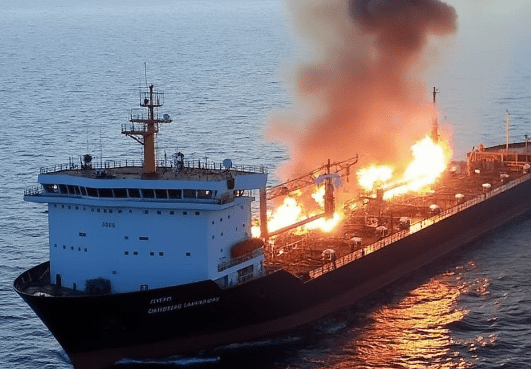On October 12, 2024, an environmental disaster was narrowly avoided in the Baltic Sea when a tanker carrying 640 tons of oil caught fire near the coast of Mecklenburg-Vorpommern, Germany. The tanker, named “Annika,” was en route from Rostock to Travemünde when a fire broke out in the rear section of the vessel, threatening to spill large quantities of oil into the sensitive Baltic waters. The region is known for its biodiversity and importance to the local economy, especially with its proximity to popular tourist areas.
Immediate Response and Crisis Management
As the fire erupted on October 11, emergency services were promptly deployed to manage the situation. The fire, located in the rear part of the ship where the engine room and deck structures are located, was deemed a critical threat. Rescue crews, including about 120 firefighters, were dispatched, with some even being airlifted onto the vessel by helicopter. A combination of water hoses and firefighting equipment was used to contain the blaze, while multiple emergency vessels worked to keep the tanker cool and prevent the fire from spreading to the oil tanks.
To avoid the risk of a catastrophic oil spill, the burning tanker was towed into the safety of the Rostock harbor, where firefighters were able to fully extinguish the fire by early morning on October 12. The tanker is now being held in port for a process known as “degassing,” which will allow dangerous fumes to dissipate, ensuring the safety of investigators as they determine the cause of the fire.
Concerns About an Oil Spill
The prospect of an oil spill along this part of the Baltic Sea coast was a major concern, not only for environmentalists but also for the local economy, which heavily relies on tourism. The region, known for its beaches and seaside resorts, could have faced long-term environmental and economic damage if the tanker had spilled its load. The proximity of the fire to tourist hotspots such as Warnemünde and Kühlungsborn heightened concerns, as any oil spill could have devastated the local marine ecosystem and beach tourism.
Fortunately, no oil was released from the tanker, sparing the coastline from what could have been an ecological disaster. The incident, however, has sparked renewed debates about the risks posed by the heavy shipping traffic along the Kadetrinne, a narrow and heavily used shipping lane between Germany and Denmark. Environmentalists and policymakers have long expressed concerns about the potential for accidents involving oil tankers in this region, given its high volume of maritime traffic.
Looking Ahead: Calls for Stricter Regulations
In the wake of this near-miss, there are growing calls for stricter safety regulations for oil tankers operating in environmentally sensitive areas such as the Baltic Sea. Politicians, environmental groups, and tourism officials alike have voiced the need for enhanced safety measures to prevent future incidents. This includes better emergency preparedness, more robust safety checks for vessels carrying hazardous materials, and perhaps even restrictions on oil tanker traffic in particularly vulnerable marine zones.
As the clean-up and investigation continue, local authorities and environmental agencies will assess the long-term impacts of the incident, ensuring that lessons are learned to prevent any similar occurrences in the future. The swift and effective response to this fire averted a disaster, but the narrow escape serves as a stark reminder of the constant risks posed by maritime oil transportation.
This event highlights the delicate balance between industry and environmental protection, particularly in regions like the Baltic Sea, where economic activity and natural ecosystems are closely intertwined.





